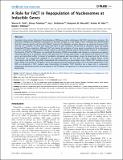| dc.contributor.author | Voth, Warren P. | en_US |
| dc.contributor.author | Takahata, Shinya | en_US |
| dc.contributor.author | Nishikawa, Joy L. | en_US |
| dc.contributor.author | Metcalfe, Benjamin M. | en_US |
| dc.contributor.author | Näär, Anders M. | en_US |
| dc.contributor.author | Stillman, David J. | en_US |
| dc.date.accessioned | 2014-03-11T13:26:28Z | |
| dc.date.issued | 2014 | en_US |
| dc.identifier.citation | Voth, Warren P., Shinya Takahata, Joy L. Nishikawa, Benjamin M. Metcalfe, Anders M. Näär, and David J. Stillman. 2014. “A Role for FACT in Repopulation of Nucleosomes at Inducible Genes.” PLoS ONE 9 (1): e84092. doi:10.1371/journal.pone.0084092. http://dx.doi.org/10.1371/journal.pone.0084092. | en |
| dc.identifier.issn | 1932-6203 | en |
| dc.identifier.uri | http://nrs.harvard.edu/urn-3:HUL.InstRepos:11879569 | |
| dc.description.abstract | Xenobiotic drugs induce Pleiotropic Drug Resistance (PDR) genes via the orthologous Pdr1/Pdr3 transcription activators. We previously identified the Mediator transcription co-activator complex as a key target of Pdr1 orthologs and demonstrated that Pdr1 interacts directly with the Gal11/Med15 subunit of the Mediator complex. Based on an interaction between Pdr1 and the FACT complex, we show that strains with spt16 or pob3 mutations are sensitive to xenobiotic drugs and display diminished PDR gene induction. Although FACT acts during the activation of some genes by assisting in the nucleosomes eviction at promoters, PDR promoters already contain nucleosome-depleted regions (NDRs) before induction. To determine the function of FACT at PDR genes, we examined the kinetics of RNA accumulation and changes in nucleosome occupancy following exposure to a xenobiotic drug in wild type and FACT mutant yeast strains. In the presence of normal FACT, PDR genes are transcribed within 5 minutes of xenobiotic stimulation and transcription returns to basal levels by 30–40 min. Nucleosomes are constitutively depleted in the promoter regions, are lost from the open reading frames during transcription, and the ORFs are wholly repopulated with nucleosomes as transcription ceases. While FACT mutations cause minor delays in activation of PDR genes, much more pronounced and significant defects in nucleosome repopulation in the ORFs are observed in FACT mutants upon transcription termination. FACT therefore has a major role in nucleosome redeposition following cessation of transcription at the PDR genes, the opposite of its better-known function in nucleosome disassembly. | en |
| dc.language.iso | en_US | en |
| dc.publisher | Public Library of Science | en |
| dc.relation.isversionof | doi:10.1371/journal.pone.0084092 | en |
| dc.relation.hasversion | http://www.ncbi.nlm.nih.gov/pmc/articles/PMC3879260/pdf/ | en |
| dash.license | LAA | en_US |
| dc.subject | Biology | en |
| dc.subject | Genetics | en |
| dc.subject | Gene Expression | en |
| dc.subject | DNA transcription | en |
| dc.subject | Chromatin | en |
| dc.subject | Molecular Genetics | en |
| dc.subject | Gene Regulation | en |
| dc.subject | Genetic Mutation | en |
| dc.subject | Genomics | en |
| dc.subject | Chromosome Biology | en |
| dc.subject | Chromosome Structure and Function | en |
| dc.subject | Model Organisms | en |
| dc.subject | Yeast and Fungal Models | en |
| dc.subject | Saccharomyces Cerevisiae | en |
| dc.subject | Molecular Cell Biology | en |
| dc.title | A Role for FACT in Repopulation of Nucleosomes at Inducible Genes | en |
| dc.type | Journal Article | en_US |
| dc.description.version | Version of Record | en |
| dc.relation.journal | PLoS ONE | en |
| dash.depositing.author | Nishikawa, Joy L. | en_US |
| dc.date.available | 2014-03-11T13:26:28Z | |
| dc.identifier.doi | 10.1371/journal.pone.0084092 | * |
| dash.contributor.affiliated | Naar, Anders | |
| dash.contributor.affiliated | Nishikawa, Joy | |


